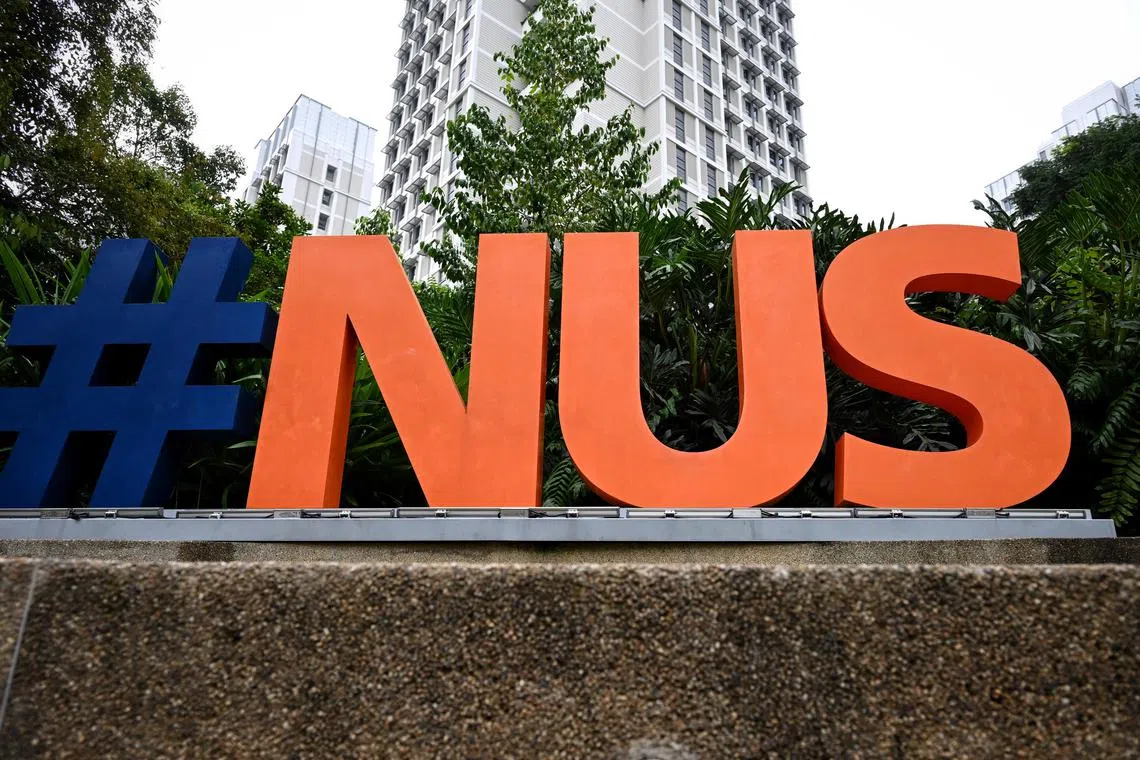40% rebate on more than 80 NUS master’s programmes from August 2024
Sign up now: Get ST's newsletters delivered to your inbox

All Singapore citizens and permanent residents can enjoy this rebate, said NUS president Tan Eng Chye.
ST PHOTO: KUA CHEE SIONG
SINGAPORE – Individuals keen on pursuing a master’s degree at the National University of Singapore (NUS) will pay 40 per cent less in tuition fees for more than 80 such programmes from August.
All Singapore citizens and permanent residents can enjoy this rebate, said NUS president Tan Eng Chye on July 26.
The rebate applies only to self-funded graduate coursework programmes that are not government-subsidised.
These courses include Master of Computing, Master of Science in Applied Biomedicine, and Master of Science in Finance.
The rebate does not apply to other research-based and coursework programmes like dentistry, law and public health.
Professor Tan was speaking at the NUS Lifelong Learning Festival, a biennial event, with this year’s focus being on artificial intelligence (AI) in the workplace. Some 250 guests attended the event, which was held at the NUSS Kent Ridge Guild House, and nearly 1,000 tuned in online.
He said that a survey done by NUS in 2023 found that a key hurdle to returning to school for continuing education and training is cost.
The survey involved more than 2,300 NUS alumni. It found that more than 60 per cent of them had participated in some form of education in the past two years and close to 90 per cent planned to take up continuing education in the next 12 months.
However, challenges like work and family commitments, as well as cost, were significant barriers to returning to school.
According to NUS, these self-funded graduate coursework programmes can cost between $40,000 and $66,000.
Prof Tan said: “We hope that this rebate will alleviate cost considerations for learners, and that you will be encouraged to learn new skills and develop yourselves further along your career journey.”
Previously, NUS offered a 20 per cent rebate for over 70 master’s programmes.
Mr Alastair Chan, who works in the medtech industry, will be benefiting from the 40 per cent rebate as he starts his Master of Science programme in applied biomedicine in August.
The 28-year-old decided to pursue graduate studies to bridge technical and skill gaps that hindered him from progressing in his career, although he was aware of the financial commitment involved in pursuing a master’s.
Mr Chan was initially not aware that he was eligible for the 40 per cent rebate.
“To learn that I was eligible to receive a large reduction of my tuition fee was a welcome relief to my financial burden and gave me some peace of mind as I moved towards my studies,” he said.
AI efforts in NUS
NUS currently offers 250 courses and 60 certificates that cover AI skills, said Prof Tan, adding that the university is currently developing four more master’s programmes focusing on AI. These are scheduled to launch in 2025.
“AI is rapidly evolving, and we seek to equip professionals with current and relevant knowledge and to build capacities in this area,” he said, adding that the new courses are part of the university’s efforts to embrace AI, which include training, research and learning.
In March 2024, the NUS AI institute was set up, bringing together AI researchers across the university, he said. It aims to boost AI research, education and industry partnerships, and also to study AI’s ethical use to address risks across various fields.
AI tools such as a generative AI platform were also developed for NUS staff and students to get answers for university-specific questions, including queries on policies.
Staff and students are receiving more guidance on the use of AI, with more workshops on course design and generating questions, and on-the-job training for administrative staff. Close to 5,000 staff have completed at least the first level of an AI competency course on topics like data literacy.
Speaking at the festival on AI’s potential impact on society and role in learning, Education Minister Chan Chun Sing said: “All technology, including the latest AI, has the potential to help us expand our capacity and networks.
“The question is, how then do we as individuals, industries, institutions and the Government, embrace this so that we make technology work for us?”
He was speaking during a dialogue with Professor Aaron Thean, NUS’ deputy president (Academic Affairs) and provost.
“In Singapore, AI can be a great multiplier to our capabilities and human potential” and this requires tackling AI issues across different levels, said Mr Chan.



